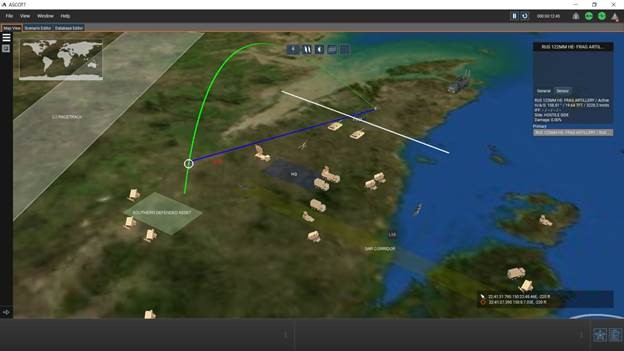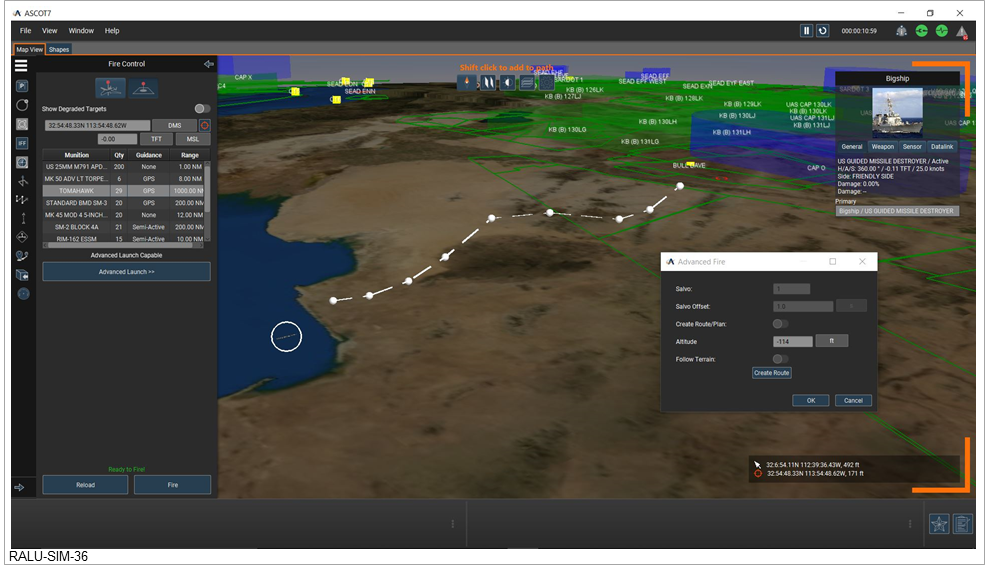ASCOT 7
Dynamic. Intuitive. Cutting Edge.
OVERVIEW
The Advanced Simulation Combat Operations Trainer (ASCOT) 7 System is a dynamic and intuitive Computer-Generated Forces (CGF) platform for use in your M&S environment. With its cutting-edge user interface, modular and scalable design, and comprehensive yet extensible database, ASCOT 7 simplifies the development of complex scenarios for your training needs and budget.

AIRSPACE AND LAYER CREATION
- Create visual layers displayed on the “Map View” shared over the network to indicate special use airspaces, political boundaries, or areas used to drive scenario objectives
- Upgrade any shape to an “Airspace” unlocking automated commands for assigned entities including “Wander;” “Wander” commands confine entities within an area offering automated movement, altitude, and speed variation
- Load Airspace Control Order (ACO) files to have shapes/ airspaces associated with an Air Tasking Order (ATO) create automatically; alter colors and parameters to dynamically change the appearance and functionality of ACO shapes
- Import layers, shapes, and terrain files (BMNG, LandSat7, OSM, DAFIF, 2525B, DTED, and others) to enhance the exercise experience and take full advantage of ASCOT 7’s physics and geographic-based modeling of entities
DYNAMIC SCENARIO CREATION AND EDITING
- Create exercises from dynamic driver inputs which can be edited and saved to use for repetitive training or combined with other exercise files to build a large force scenario
- All commands can be edited, copied, or deleted; each detail of a command can be altered to execute a unique entity response creating realism and supporting training objectives
- Flexible and straightforward UI provides numerous ways to edit a scenario from basic heading, altitude, and speed commands to scripting IFF transponder changes or RADAR beam frequency alterations
- Stacked automated commands reduce driver workload and increase role playing efficiency; automated entities perform commands in sequence based on the drivers time table
DATA LINK MODELING
- Fully integrates with live operational systems to transmit and receive data link packet information; simulates Link16 and Link11 network architecture to provide realistic data transfer from link capable entities to real-world equipment
- Comprehensive UI gives drivers the ability to model entities operating in a tactical link environment providing operators with data link feedback, automated link responses, and tailored message sets
- Drivers can use geographic factors, transmitter limitations, or jamming to initiate link troubleshooting training; or remove all interruptions to focus on process and procedures
- Comprehensive data link message library from MIL-STD 6016E and STANAG 5516 Ed 6
- Emission tracking to link conversion shares line-of-bearing indications of tracks to other link participants internally and externally connected through the exercise network
DATABASE EDITING
- Databases can be edited during scenario creation or at exercise runtime to alter future created entities; edit entity parameters, munitions, expendables, systems/sensors, resources, and more
- Quickly duplicate entities and edit to create operational modifications, foreign variations, or expand the database by building unique systems or advanced modernized equipment
- Add or remove database elements to create customized libraries catered to specific exercises, designed for software/hardware integration, or DIS and HLA compliant simulation suites
- Streamlined UI helps drivers to navigate to database types and search for particular fields for editing; quickly alter values and adjust the exercise timeline to see the results immediately
EMITTER MODELING AND TRACK SHARING
- Advanced emitter customization including beam parameters, frequency, effective range, clutter, plot loss, scan specification, and Area of Probability (AOP)
- Simulate Air Traffic Services (ATS) information through an ASTERIX capable RADAR; data can be used to stimulate correlation and tracking software and equipment referencing simulated entities
- RADAR generated data simulates real-world RADAR, Identification Friend or Foe (IFF) interrogators, Automated Dependent Surveillance-Broadcast (ADS-B), and strobe indications
- Fully functional RADAR Cross-Section (RCS) modeling, when combined with ASTERIX based RADARs provides advanced track detection and interrogation training environments
- Establish auto-tracking criteria by activating a particular emitter’s beam based on the identification and distance of a target to the system; replicate individual fighter timelines for training
GROUPS AND INTEGRATED AIR DEFENSE SYSTEM (IADS)
- Advanced emitter customization including beam parameters, frequency, effective range, clutter, plot loss, scan specification, and Area of Probability (AOP)
- Group entities together to form entity owned internal networks sharing track information, sensor data connection, and distributed munition control
- Simulate real-world IADS systems by assigning entities to particular roles within a Surface-to-Air (SAM) battery, functioning as air surveillance, battle management, and weapons controls
- Link together different environment types to model state-of-the-art integrated networks; attach airborne early warning to multiple ground systems defending multiple geographically separated locations
- Simple visual UI gives drivers the flexibility to design, build, edit, and remove groupings/ IADS quickly and easily during exercise execution; drive individual engagements or allow automated entities to prosecute targets
TRANSPONDER NOTIFICATIONS AND JAMMING EVENTS
- Complete control over IFF transponder and signal transmission states; assign Modes 1-5 and Mode C, alter system operation, change codes, or script transmission states to occur at specific times and locations
- Attach interrogators or transmitters to any entity to send out erroneous codes or transponder states supporting tactics, techniques, and procedures for tracks of interest
- Add a jamming system at any time to any entity; edit the range, azimuth, elevation, frequency, and beam parameters [Including Pulse Repetition Frequency (PRF) and Effective Radiated Power (ERP)]
- Easily model self-protection systems by establishing auto jamming rules based on the identification of the target entity or the distance of the received acquisition emission
ENGEN
EnGen provides:
- The power behind ASCOT 7
- Powerful global simulation framework which enables multiple PLEXSYS products to perform as environment generators
- Master Server and Server Node
- Facilitates process distribution
- The quick development of applications that leverage simulation-time and data management
- 3D viewing capability and a modeling interface to process any live and simulated data sets
- Scalability and open architecture
- Compatibility with a wide variety of environment generators
SESSION MANAGER
Session Manager provides:
- Scalability via distributed server configuration for the master server
- Remote launch and shutdown of PLEXSYS products
- Remote launch of third-party applications
- Concurrent management of multiple active and inactive sessions
- Save, load, and edit session configurations

